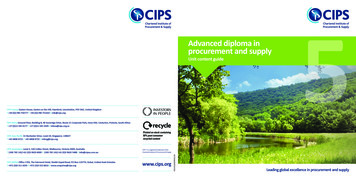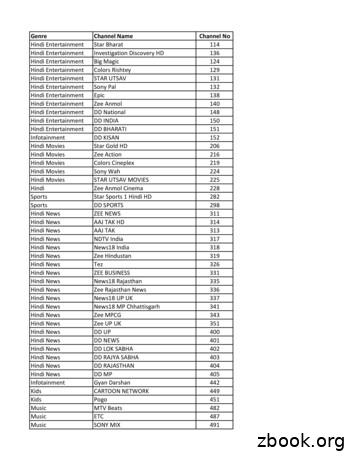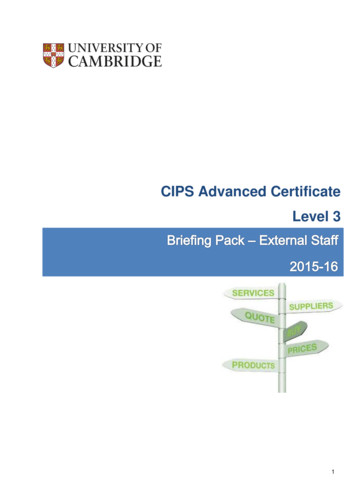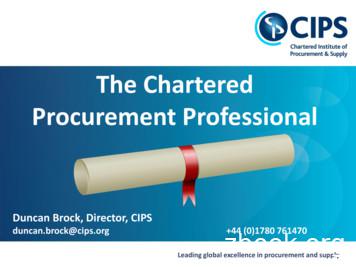CIPS WINTER 2019-2020 NEWS BRIEFS
CIPS WINTER 2019-2020 NEWS BRIEFSLetter from the EditorDear CIPS Members,Bringing you this issue of our News Briefs is a special pleasure, since, through our“Reflections” section, it paints a lively picture of our Biennial CIPS/NAPsaC ClinicalConference which was held last May. I am always inspired and intrigued when I read aboutthe many individual accomplishments of our members, but it is powerful in a different way tohear about our colleagues coming together for deep conversation on crucial issues. Specialthanks to Maureen Murphy, Johanna Boyce, William Fried, Carolyn Steinberg, Mary Walland Peter Wolson for sharing their thoughts, feelings, and observations about theconference with such eloquence and to Lisa Halotek for providing photos.As always, I am indebted to our CIPS reporters: Joe Davis (LAISPS), Susan Mitchell (PCC),Dave Parnes (NPSI), Drew Tillotson (PINC), Mary Wall (CFS), and Leslie Wells (IPTAR).These are very busy and committed people asking equally busy and committed colleaguesto supply much-detailed information. I appreciate the graciousness of all reporters and allcontributors in finding time to keep us updated. My gratitude also to Robin Deutsch,NAPsaC president, who is diligent in nurturing the connection between CIPS and NAPsaC.Finally, it has been a joy to work with our new president, Batya Monder. Batya is a lovelyindividual who steers our CIPS ship with quite a competent and creative hand. I know youwill join with me in thanking her for giving so many hours and already doing an excellent job.Please enjoy this issue and whatever holidays you celebrate!Warmest regards,Carol Mason-StraughanManaging Editor
Letter from the PresidentI assumed the presidency of CIPS at the end of June 2019,and now well into the fall, I am beginning to settle into mynew role. I have had the good fortune to share a steeplearning curve with Lisa Halotek, the vice president ofCIPS. Both of us have been guided on our new path withgentleness and encouragement from Terry McBride, thepast president, and welcomed and aided by other membersin leadership roles in CIPS. I am aware how much I havelearned since I assumed office and how much I am stilltrying to digest.My first official role as president of CIPS was to welcome members to a CIPS reception inLondon at the IPA Congress in July. We had a wonderful turnout, and despite no airconditioning on the hottest day in London’s history and a problem with the catering services,CIPS members came and stayed and enjoyed being with one another.We will be hosting another reception Thursday, February 13, 2020, in New York at the timeof the APsaA meetings. If you plan to attend the meetings or are in the New York area,please make note of the date. The reception will be combined with a book signing for thelatest book in the CIPS Book Series, Trauma and the Destructive-Transformative Struggle:Clinical Perspectives, edited by Terrence McBride and Maureen Murphy, and will be held atthe Penn Club, 30 West 44th Street, from 5:30 to 7 pm. Look for an invitation in your email.CIPS has been a wonderful professional community for many of us, enlarging our collegialworlds each time we come together at a biennial CIPS Clinical conference or in a CIPSteleconference or at a CIPS reception. But some members of our component societies arenot aware of CIPS as also their organization. Similarly, many candidates are not aware thatthey too belong to CIPS which connects them to colleagues both across the US and abroad.It is my hope that Lisa and I can impart more of that understanding to the membershipduring our term of office, building on the work of Terry McBride who communicated, inwriting, every opportunity he could about the complex web of organizations that CIPS isaffiliated with.They include of course our connection with the IPA, ensuring that our members have avoice in the International Psychoanalytical Association. Less understood but also ofsignificance is CIPS connection with four important national organizations: thePsychoanalytic Consortium, which works actively to maintain higher standards ofpsychoanalytic training in the US; the Psychotherapy Action Network (PsiAn), whichpromotes psychoanalytic psychotherapy; the Patient Privacy Rights Coalition and theMental Health Liaison Group (MHLG), which together address matters of confidentiality,public policies and legislation in regard to psychoanalysis.
CIPS now has a new co-chair of the Public Policy Committee--Andrew Berry, who joinsMaurine Kelly in monitoring the work of these organizations and reporting them to thepresident so that CIPS can sign on to various legislative initiatives when they pertain to ourmission.We also have a new chair of the Teleconference Committee, Elizabeth (Beth) Reese, whohas brought energy and enthusiasm to the position, and wonderful new ideas. Ourteleconferences will henceforth be videoconferences, and new this year will be 2-sessionclasses by authors of recently published books. Beth has lined up some wonderful coursesfor us, and those announcements will be going out on-line shortly.New work has begun on the CIPS website. The webmaster, Bob Lettiere and our liaison tohim, Diana Daimwood, and I sat down in my office to review what needed to be updated,removed, etc. Member rosters are the first area that will be addressed. Information has beensent to the Directors of each society to update membership lists and to see if members arewilling to participate in a members-only roster, a useful resource for making referrals.Certification is also a subject that we are again addressing this year. Accreditation fortraining and supervising psychoanalysts and for faculty will soon be required in California.Other states will follow in due time, and you can be ahead of the curve and apply for theBCpsa (Board Certified Psychoanalyst) certification that CIPS provides. Many CIPSmembers have already done so. Sometime in the spring we will be announcing a newcertification period. Details about that will be forthcoming.The CIPS board meets monthly, and many initiatives are underway. I will be reporting onour work in the next News Briefs and will be updating the President’s Letter on the CIPSwebsite in between issues of News Briefs. And soon we will begin thinking about andplanning for our next Biennial Clinical Conference in spring 2021.I invite members and candidates of CIPS to learn more about CIPS and to participate inyour CIPS community.Warm regards to all,Batya R. MonderPresident
Letter from the Vice PresidentDear Colleagues,It is an honor to serve as your Vice President for thenext two years, and I’m eager to get to know more ofyou in the coming years ahead. I’ve been involved withCIPS over the years as Editor of the News Briefs andas a director representing LAISPS. I’ve had the good fortune to attend several of the CIPSconferences and events and to meet members from around the country.What I’ve discovered is that many of us are often confused about the role that CIPS playsand how it benefits us. I’d like to highlight for you some of our current activities, services andprograms that are available to all of us as individual members and how CIPS works to makea difference in our profession and in our professional lives: The promotion of the interests and initiatives of our component societies and ourmembers in relation to the IPA, NAPsaC, The Psychoanalytic Consortium and thepsychoanalytic world beyond.Combined influence on strengthening NAPsaC to represent our societies asmembers of the North American Regional Organization, comparable to the EPF andFEPAL in Europe and Latin America.Representation on the Psychoanalytic Consortium, along with other majorpsychoanalytic organizations in the United States, along with APsaA, Division 39,AAPCSW and AAPDP.In support of our profession and our practices, efforts to strengthen psychoanalysis inregard to public policy and legislative issues such as private practice, privacy laws,certification and licensing, etc., and to affiliate with organizations such as the MentalHealth Liaison Group (MHLG), the Coalition for Patient Privacy rights, and thePsychoanalytic Action Network (PsiAn).The biennial CIPS/NAPsaC Clinical Conference, alternating between the East coastand the West Coast, which features a panel presentation on topics of current interestby prominent psychoanalysts, followed by small group meetings in which participantspresent clinical case material for discussion and feedback.Board Certification in Psychoanalysis, an inevitable requirement as our Institutesmove toward accreditation, with the designation BCPsa and a Board of ExaminersCertificate in Psychoanalysis. Our next enrollment will be coming up in the earlyspring of 2020.The CIPS Book Series, The Boundaries of Psychoanalysis, which offers theopportunity to author or edit a book published by Routledge.Short-term and ongoing Teleconference Seminars on elective topics, either as aparticipant or an instructor, with accompanying professional exposure.
For Candidates, full membership in CIPS and paid dues for membership in the IPAInternational Psychoanalytic Student Organization (IPSO), with eligibility for reducedIPA Congress fees and reduced lodging fees, as well as discounts for access to PEP.Find an Analyst listing on the CIPS website for referrals.Access to discounts at Club Quarters Hotels around the world.The opportunity to meet and interact with other psychoanalytic colleagues fromdifferent parts of the U.S. and internationally.CIPS was founded in the early 1990’s to represent the independent societies in the UnitedStates that had just been admitted to full membership in the IPA. It was a groundbreakingdevelopment in the shifting structure of the IPA toward greater democratic participation.Since then, CIPS has flourished in its mission to support the professional, intellectual andclinical development of its members, to promote high standards of training and licensure forpsychoanalysis as a profession, and to protect patient privacy rights and other public policyinterests through programs of public information and political advocacy.CIPS is comprised of all six of the independent IPA psychoanalytic societies in the U.S.They are the Contemporary Freudian Society (CFS), the Institute for PsychoanalyticTraining and Research (IPTAR), the Los Angeles Institute and Society forPsychoanalytic Studies (LAISPS), The Northwestern Psychoanalytic Society andInstitute (NPSI), the Psychoanalytic Center of California (PCC), and thePsychoanalytic Institute of Northern California (PINC).A seventh group, the Direct Member Society, is for IPA analysts who are not members ofCIPS component societies, but who wish to be members of CIPS. Each of the componentsocieties of CIPS has 2 representatives on the CIPS Board of Directors.All CIPS members are members of the IPA and are represented on the IPA Board ofDirectors. At least one, and up to two, independent representatives from the NorthAmerican region are guaranteed to represent us on the IPA Board.If you are interested in participating in any of the activities listed above, please contactPresident Batya Monder or myself or one of your society representatives to the CIPS Board.Check out the CIPS website, www.cipsusa.org for more information.I hope that this letter gives you a deeper understanding of the CIPS mission and that myletter might encourage you to get involved in CIPS in whatever capacity interests You.With warmest regards,Lisa HalotekVice President
REFLECTIONSReflections from Maureen Murphy (PINC)The Biennial CIPS/NAPsaC Clinical ConferenceCRASHING THE CONSULTING ROOM:GLOBAL DISRUPTION AS PSYCHIC AGGRESSIONNew York, May 3-4, 2019We are living in truly extraordinary times. National and global turmoil reverberates throughour daily lives and ruptures the psychic experience of our country’s citizens, our patients,and ourselves. Political, social, and economic upheaval bombards us through unlimitedaccess to all forms of media. Rapidly shifting technologies deliver news of tragedies, absurdpolitical decisions, natural tragedies, severe and volatile climate events, and outrageousacts of violence against citizens of every race, gender, religion, sexuality and social class.Anger, depression, deep anxieties, resistance, confusion, panic, fatigue and resignationhave come to the fore in multiplying and not always obvious layers for all of us in thisatmosphere. Hatred and terrorism of all sorts strike at the most basic element of the humanpsyche-a sense of safety.In this atmosphere of interpersonal violence, as Sergio Nick says: “Psychoanalysts, asmuch as our patients, are crossed by the cultural environment in which we live."Increasingly analysts are confronted with escalations of patients’ anxieties and fantasiesabout social, political, and global events that fall between the material and the unconscious.More than ever, we find ourselves struggling to balance our roles as concerned citizensdialoging with fellow citizens with our role as analysts treating patients.In planning this conference, we hoped to deploy the solidly clinical emphasis of theCIPS/NAPsaC conferences to help address the necessity of a reconceptualization oftransference and countertransference to encompass this moment in time theoretically andtechnically. How do we address the underlying terror of our own destructiveness to both selfand others? How do we understand and analyze circumstances in which repeated externalthreats reignite internal terror without resorting to formulaic responses?THE PANELThe conference began on Friday evening at the Explorer’s Club with an international panelof three distinguished clinicians who have spent a great deal of their careers mapping thetrajectory of aggression -theoretically and clinically. Their presentations offered us possibleways of translating concepts familiar to us even when global aggression crashes into theconsulting room.Cordelia Schmidt-Hellerau, training and supervising analyst at the Swiss PsychoanalyticSociety and at the Boston Psychoanalytic Society, opened the panel. She brought herexpertise in metapsychology, particularly drive theory, and its clinical application tocontemporary versions of aggression. She is the author of three books and over 40 articles,
most recently Driven to Survive.Dr. Schmidt-Hellerau set the tone for the conference with the following: “Now – in times ofsprouting terror and politically administered assaults on the basic values of democraticsocieties – it is important for psychoanalysts to rethink their understanding of aggression.How do violence and hatred come about? How can they be stirred and manipulated? Howdoes the shameless display and public sanction of killing and bullying affect the individualmind?”The second presenter was Louis Brunet, past President of the Canadian PsychoanalyticSociety and of the Psychoanalytic Society of Montreal. His work on terrorism dates back to1989 and since then he has published numerous papers on individual violence, groupviolence, terrorism and radicalization from a psychoanalytic perspective. In his paperentitled, “Destructivity and Narcissistic Identity Suffering," Dr. Brunet proposes:“As analysts, we face many forms and expressions of destructivity either of a person againsthimself or against others; of destructivity in the transference, of destructivity toward us ortoward the process. In narcissistic identity suffering we find the destruction of the object,internal and external object. Thus, we need to have not only a meta-theory of destructivity,but we need a clinical theory of destructivity, a theory we can use clinically in the session, inthe transference."The panel concluded with a presentation by Sergio Nick, Vice President of the IPA and achild, adolescent and adult psychoanalyst at the Brazilian Psychoanalytic Association in Riode Janeiro. In his role as IPA Vice President and as an analyst working in a country rife withthe oppression of human rights, Sergio is in a unique position to comment on the impact ofglobal aggression. Dr. Nick began his paper commenting on the political effect on thepsyche:"The twenty-first century watches parading before us leaders that would not have stood achance of being heard before, given the number of insanities that they say. Thus, there is anew wave going on in the world that still lacks studies and a better understanding. In thispaper, I intend to discuss how the changes in the political discourse can affect the humanpsyche, based on some ideas that I psychoanalysts to rethink their understanding ofaggression. How do violence and hatred come about? How can they be stirred andmanipulated? How does the shameless display and have been developing aroundIntersubjectivity and the psychic processes.”THE AWARDS CEREMONYFollowing the panel was an important part of the conference - the Awards Ceremony.The vitality of our two organizations is sustained through the contribution of generousmembers who are tireless in their commitment to psychoanalysis.This year Leigh Tobias was the recipient of the Distinguished Service Award for herdedicated and creative leadership.
Randi Wirth was honored for her enduring commitment to the excellence of these ClinicalConferences.Sergio Nick was honored for his commitment to and support of CIPS/NAPsaC. In addition,Phyllis Sloate acknowledged and thanked the Certification Board of Examiners: Charles J.Spezzano, Chair (PINC), Jeannette C. Gadt, Co-Chair (PCC), Michael J. Diamond (LAISPS,Danielle Knafo (IPTAR), Robert Oelsner (NPSI) and Joann K. Turo (CFS).THE CLINICAL GROUPSOn Saturday, conference moved to IPTAR where participants worked in facilitated smallgroups - the long-time trademark of this conference. Participants brought material from anongoing case on the topic of the conference theme. Each participant had 45 minutes topresent with time for discussion. The richness of the experience was enhanced byeveryone’s varied background, orientation, training and influences.Reflections from Johanna Boyce (Direct Member)I am one of five analysts in close quarters in room #17 at IPTAR’s clinical center. Spread outin IPTAR’s various offices are other similar small groups. We have come together in theseintimate spaces to explore the loosely held conference topic and how it might relate to ourpractice. With mutual regard and carefully considered confidentiality, we each offer a briefpatient vignette and as we learn of our patient’s conflicts and share our thoughts, we alsocome to know one another as analysts/persons in a way that feels genuine, appreciativeand encouraging.I think of the day’s space configuration, each group in its own small discussion room withinthe larger clinical space and it seems to parallel the structure of CIPS: small independentsocieties operating on their own, yet also existing within a network of affiliation, united vialocation in the US, but connected in history, interests and spirit to the IPA.I also think of the space in which we met on Friday night: The Explorer’s Club, in whichthree thoughtful and inspiring papers were presented. The Explorer’s Club is an elegant andstoried place hosting a manifest testimony to herculean expeditions; adventures to thedepths and heights of the earth and beyond, all undertaken with great fortitude, skill,invention and bravery.These exploratory adventures seemed in keeping with the analytic endeavor which dares toexplore and plumb the mind’s depth and attempts to voyage into the hidden and difficult toaccess regions of the unconscious.The analogy led me to consider the dangers of exploration, especially if it is in the service ofconquest. What would the equivalency be in analysis of planting flags in discoveredterritory- the narcissistic needs of the analyst intruding into the work and demanding aclaim?These were some of the thoughts that occurred to me: thoughts about the spaces weinhabit, both internally and externally, and how they intersect, influence,
For Candidates, full membership in CIPS and paid dues for membership in the IPA International Psychoanalytic Student Organization (IPSO), with eligibility for reduced IPA Congress fees and reduced lodging fees, as well as discounts for access to PEP. Find an Analyst listing on the CIPS website for referrals.
CIPS Asia PacificIG Rochester Drive, Level HJ, Singapore, GINLIM TPLK LNFN NMHG FPLK LNFN NMHH Einfosg@cips.org CIPS AustralasiaLevel H, KHF Collins Street, Melbourne, Victoria IFFF, Australia TGIFF MLK GJH/PLG (F)I OLHO LFFF FGIFF MLK GJI/PLG (F)I OLHF KJNN Einfo@cipsa.com.au CIPS MENAOffice GMFI, The Fairmont Hotel, Sheikh Zayed Road, PO Box GGOMMJ, Dubai, United Arab Emirates TPOMG (F)J IGG .
Hindi News NDTV India 317 Hindi News TV9 Bharatvarsh 320 Hindi News News Nation 321 Hindi News INDIA NEWS NEW 322 Hindi News R Bharat 323. Hindi News News World India 324 Hindi News News 24 325 Hindi News Surya Samachar 328 Hindi News Sahara Samay 330 Hindi News Sahara Samay Rajasthan 332 . Nor
CIPS Level 5 5 Advanced Diploma in Procurement and Supply Ref: 603/3925/1 6\OODEXV Version 1 Fhyzics Business Consultants Pvt. Ltd. An Approved Study Centre of CIPS, UK www.IISCM.org cs@fhyzics.net 91 900-304-9000. Your TXDOLIÂFDWLRQ Next steps 7KLV TXDOL 4FDWLRQ SURYLGHV SURJUHVVLRQ WR WKH CIPS Level 6 Professional Diploma in Procurement and Supply. 5HIHUV WR OHYHOV ZLWKLQ WKH 8. 54 .
The University CIPS Level 3 Programme 2.1. About the CIPS Programme The University’s CIPS Level 3, Advanced Certificate in Procurement and Supply Operations programme is partly funded through the Finance Division. You may apply if you work in one of the University colleges, the University Press or Cambridge Assessment or other associated institution, although funding will be requested from .
Leading global excellence in procurement and supply 1 The Chartered Procurement Professional Duncan Brock, Director, CIPS duncan.brock@cips.org 44 (0)1780 761470 . Leading global excellence in procurement and supply 2 Introducing CIPS Chartered Body Charitable Status Awarding Body Membership Organisation CIPS for Business . Leading global .
platforms/channels,, you agree to accept any changes made to the terms and conditions. CIPS Membership Subscriptions and MyCIPS CIPS Membership subscriptions and all CIPS membership fees quoted are for annual subscriptions (12- months). You are required to renew and mak
CIPS Position on Practice P&SM: Contract . Management . The activities of a buyer before, durin g and after a contract is signed, to ensure that all parties to the contract understand and fulfil their contractual obligations. CIPS members can record one CPD hour for reading a CIPS Knowledge
Based on the results obtained, it can be concluded that learning by using guided inquiry-based chemistry module is effective in improving students' character and concept understanding. Keywords: T. he effectiveness of learning ,Character Guided Inquiry Module Concept Understanding Classical Completeness Criteria . 1. Introduction . Chemistry is one of the subjects that is closely related to .























